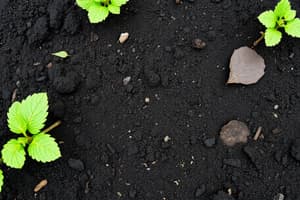Podcast
Questions and Answers
Which of the following river systems are responsible for depositing alluvial soil?
Which of the following river systems are responsible for depositing alluvial soil?
- Indus, Ganga, and Brahmaputra
- Mahanadi, Godavari, and Krishna
- All of the above (correct)
- None of the above
Alluvial soil is found only in the northern plains of India.
Alluvial soil is found only in the northern plains of India.
False (B)
What is the ideal crop for black soil?
What is the ideal crop for black soil?
Cotton
The Deccan trap region is spread over the ______________ plateau.
The Deccan trap region is spread over the ______________ plateau.
Match the following types of soil with their characteristic features:
Match the following types of soil with their characteristic features:
Which of the following is a factor in the formation of black soil?
Which of the following is a factor in the formation of black soil?
Alluvial soil is found in the eastern coastal plains particularly in the deltas of the Indus and Brahmaputra rivers.
Alluvial soil is found in the eastern coastal plains particularly in the deltas of the Indus and Brahmaputra rivers.
What is the reason for the intensive cultivation and dense population in regions of alluvial soil?
What is the reason for the intensive cultivation and dense population in regions of alluvial soil?
Flashcards are hidden until you start studying
Study Notes
Alluvial Soils
- Most widely spread and important soil in India
- Covers entire northern plains, Rajasthan, Gujarat, and eastern coastal plains
- Deposited by three Himalayan river systems: Indus, Ganga, and Brahmaputra
- Also found in deltas of Mahanadi, Godavari, Krishna, and Kaveri rivers
- Very fertile, with adequate proportion of potash, phosphoric acid, and lime
- Ideal for growing sugarcane, paddy, wheat, and other cereal and pulse crops
- Regions with alluvial soils are densely populated and intensively cultivated
Characteristics of Alluvial Soils
- Consists of various proportions of sand, silt, and clay
- Soil particles appear bigger in size as you move inlands towards river valleys
- Coarse soils common in piedmont plains such as Duars, Chos, and Terai
- Classified into old alluvial (Bangar) and new alluvial (Khadar) based on age
- Bangar soil has higher concentration of kanker
Black Soils
- Also known as regur soils, ideal for growing cotton
- Black in color, typical of Deccan trap (Basalt) region
- Covers plateaus of Maharashtra, Saurashtra, Malwa, Madhya Pradesh, and Chhattisgarh
- Forms in areas with specific climatic conditions and parent rock material
- Rich in soil nutrients, such as calcium carbonate, magnesium, potash, and lime
- Can hold moisture well due to extremely fine, clayey material
Studying That Suits You
Use AI to generate personalized quizzes and flashcards to suit your learning preferences.




